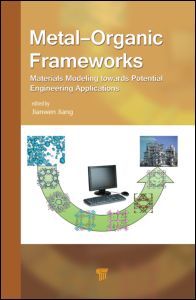Description
Metal-Organic Frameworks
Materials Modeling towards Engineering Applications
Coordinator: Jiang Jianwen
Language: English
Subjects for Metal-Organic Frameworks:
Keywords
MOFs; zeolitic; GCMC Simulation; imidazolate; H2 Mixture; adsorption; American Chemical Society; isotherm; H2 Adsorb; co2; Isosteric Heat; density; Open Metal Sites; functional; CO2 Adsorption; theory; H2 Molecule; molecules; CH4 Mixtures; open; ZIFs; Adsorption Isotherms; Guest Molecules; CO2 Molecules; PDWL Unit; CO2 Selectivity; Cc Level; Mesoporous MOFs; Van Baten; Higher CO2 Selectivity; Sp Ir; DMA Cation; CO2 Separation; Bet Surface Area; Radial Distribution Functions
· 15.2x22.9 cm · Hardback
Description
/li>Contents
/li>Biography
/li>
Metal-organic frameworks (MOFs) have emerged as a new family of nanoporous materials. With an enormous choice of inorganic/organic building blocks, MOFs possess a wide range of surface area, pore size, and functionality and, thus, have been considered versatile materials for many potential applications. This book presents a broad collection of recent modeling studies in the field of MOFs toward potential engineering applications, such as gas storage/separation, carbon capture, catalysis, water purification, and drug delivery.
Computational Approaches to the Design, Crystal Structure Prediction, and Structure-Property Relationships of Metal-Organic Frameworks. On the Application of Classical Molecular Simulations of Adsorption in Metal-Organic Frameworks. Modeling the Adsorption of Small Molecules at Coordinatively Unsaturated Metal Sites: Density-Functional Theory and Molecular Mechanics Approaches. Accurate ab initio Description of Adsorption on Coordinatively Unsaturated Sites in Metal-Organic Frameworks. Modeling Sorbate Equilibria and Transport in Porous Coordination Polymers. Modeling Quantum Effects on Adsorption and Diffusion of Hydrogen in Metal-Organic Frameworks. Molecular Modeling of Gas Separation in Metal-Organic Frameworks. Molecular Modeling of Metal-Organic Frameworks for Carbon Dioxide Separation. Modeling of Zeolitic-like Hybrid Materials for Gas Separation. Modeling Adsorptive Separations using Metal-Organic Frameworks. Computer Simulations of Ionic Metal-Organic Frameworks. Computational Modeling of Catalysis in Metal-Organic Frameworks. Modeled Catalytic Properties of Metal-Organic Frameworks-Based Compounds.
Jianwen Jiang is an associate professor in the Department of Chemical and Biomolecular Engineering at the National University of Singapore. His research expertise is computational materials modeling and statistical thermodynamics, currently focused on nanoporous and membrane materials for energy, environmental, and pharmaceutical applications. He has published over 160 technical manuscripts, as well as a number of invited reviews and book chapters. He is on the editorial boards of Scientific Reports, Frontier in Materials, Advances in Materials Research, and Colloid and Interface Science Communications, among others. In 2010, he received the IES Prestigious Engineering Achievement Award from the Institution of Engineers, Singapore.




